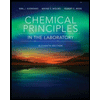A. Ammonia is an acid and vinegar is a base, so a neutralization reaction would occur. The pH would be closer to 7 than either the vinegar or ammonia alone. Nothing would happen. B. Ammonia is an acid and vinegar is a base, so a stronger acid would form. C.Vinegar is an acid and ammonia is a base, so a stronger base would form. D. Vinegar is an acid and ammonia is a base, so a neutralization reaction would occur. The pH would be closer to 7 than either the vinegar or ammonia alone. A salt and water would be produced.
Ionic Equilibrium
Chemical equilibrium and ionic equilibrium are two major concepts in chemistry. Ionic equilibrium deals with the equilibrium involved in an ionization process while chemical equilibrium deals with the equilibrium during a chemical change. Ionic equilibrium is established between the ions and unionized species in a system. Understanding the concept of ionic equilibrium is very important to answer the questions related to certain chemical reactions in chemistry.
Arrhenius Acid
Arrhenius acid act as a good electrolyte as it dissociates to its respective ions in the aqueous solutions. Keeping it similar to the general acid properties, Arrhenius acid also neutralizes bases and turns litmus paper into red.
Bronsted Lowry Base In Inorganic Chemistry
Bronsted-Lowry base in inorganic chemistry is any chemical substance that can accept a proton from the other chemical substance it is reacting with.
A. Ammonia is an acid and vinegar is a base, so a neutralization reaction would occur. The pH would
be closer to 7 than either the vinegar or ammonia alone. Nothing would happen.
B. Ammonia is an acid and vinegar is a base, so a stronger acid would form.
C.Vinegar is an acid and ammonia is a base, so a stronger base would form.
D. Vinegar is an acid and ammonia is a base, so a neutralization reaction would occur. The pH would
be closer to 7 than either the vinegar or ammonia alone. A salt and water would be produced.

Trending now
This is a popular solution!
Step by step
Solved in 2 steps









